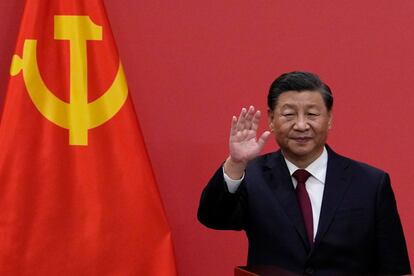Xi Jinping becomes the most powerful Chinese leader since Mao
The secretary general, who was re-elected for an unprecedented third term, may lead China until 2032


Xi Jinping secured absolute control of the Chinese Communist Party (CCP) on Sunday, becoming the most powerful leader since Mao Zedong. The CCP’s central committee elected him as general secretary for an unprecedented third term. Xi also unveiled the Politburo Standing Committee, stacked with loyalists, that will determine the path of the country’s development in the next five years. “They are quite familiar to you,” Xi said while introducing his six “comrades” at Beijing’s Great Hall of the People, before Chinese and international media.
Xi’s new team has been tailored to his needs. It does not include members of other factions of the CCP, marking a break from the traditional system of check and balances that has been respected in recent decades. Xi has also not singled out anyone as his successor, meaning he could renew his position for a fourth term and maintain power until 2032.
The seven members of the Politburo Standing Committee, the highest governing body, entered the Great Hall of the People, in Tiananmen Square, through a huge door with golden decorations. The group, led by Xi, stepped on to the dais and lined up around the leader in strict hierarchical order: Li Qiang, Zhao Leji, Wang Huning, Cai Qi, Ding Xuexiang and Li Xi. The six chosen to accompany Xi at the summit of the CCP posed motionless as soldiers, while the secretary general introduced them one by one.
There was nothing random about the ceremony; the order in which each member stepped on to the dais is believed to represent their rank in the party’s top body. Xi, at the lead, will most likely be the next head of state, the next figure usually holds the position of prime minister, while the third is typically the head of the National People’s Congress. But these posts will not officially be appointed until the annual legislative session in March 2023.
Xi hopes to be officially confirmed as president for a third term in March, which would definitively cement his power. This is possible thanks to his 2018 reform of the Chinese Constitution, which eliminated the two-term limit on the presidency.
Li Qiang, the new number two, stands out among the new members of the Politburo Standing Committee. He replaces Li Keqiang, who was considered a counterweight to Xi, but also one of the weakest premiers in recent decades. Without him, there will be no checks and balances. China’s No. 2 official, if the appointment is confirmed in March, will instead go to a staunch Xi loyalist. Until now, Li Qiang had served as party secretary in Shanghai, the megacity that implemented a strict two-month long Covid-19 lockdown. At the time, many criticized the measures as Draconian and believed they could hurt Li Qiang’s political prospects. But the opposite has been true: analysts believe that he has been elevated for strongly supporting Xi’s zero-Covid policy.
Only three of the seven members of the previous Politburo Standing Committee remain: Xi, No.3 official Zhao Leji and No. 4 official Wang Huning, one of the party’s most reputable ideologues. Wang Huning has been behind some of Xi’s key slogans, and is credited as being the architect of the leader’s “Chinese dream.” But the official also helped shape some of the key ideas of Xi’s predecessors, former presidents Hu Jintao and Jiang Zemin. Wang studied for a time in the United States, which prompted him to write the 1991 book America against America. For many in China, the book is considered prophetic, particularly in the view of the assault on the US Capitol.
Also joining the new team as No. 7 is Ding Xuexiang, who is effectively Xi’s chief-of-staff and currently heads the powerful Central Committee’s powerful General Office. The No. 2 of this office was one of the men who helped to remove former Chinese president Hu Jintao, Xi’s predecessor, from the closing ceremony of the CPP’s national congress on Saturday. The footage of the 79-year-old being led off stage, a little more than two hours into the 3.5-hour meeting, quickly went viral. State media said the former leader was escorted out because he was “not feeling well,” but some analysts believe it may have Xi’s way of sending a message.

The Politburo Standing Committee is the apex of power of the CCP, which in China is more important than the state itself. Technically, the members are elected by the central committee, the third echelon of power, whose 205 members were elected on Saturday. This committee, after their first plenary session, elected the 24 new members of the Politburo (the second echelon) and the seven members of the Politburo Standing Committee. No women were elected to the new Politburo; in the previous term, there was only one.
Tu suscripción se está usando en otro dispositivo
¿Quieres añadir otro usuario a tu suscripción?
Si continúas leyendo en este dispositivo, no se podrá leer en el otro.
FlechaTu suscripción se está usando en otro dispositivo y solo puedes acceder a EL PAÍS desde un dispositivo a la vez.
Si quieres compartir tu cuenta, cambia tu suscripción a la modalidad Premium, así podrás añadir otro usuario. Cada uno accederá con su propia cuenta de email, lo que os permitirá personalizar vuestra experiencia en EL PAÍS.
¿Tienes una suscripción de empresa? Accede aquí para contratar más cuentas.
En el caso de no saber quién está usando tu cuenta, te recomendamos cambiar tu contraseña aquí.
Si decides continuar compartiendo tu cuenta, este mensaje se mostrará en tu dispositivo y en el de la otra persona que está usando tu cuenta de forma indefinida, afectando a tu experiencia de lectura. Puedes consultar aquí los términos y condiciones de la suscripción digital.








































